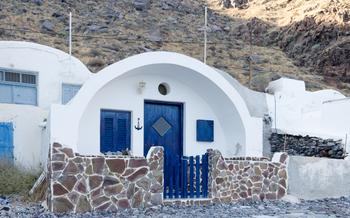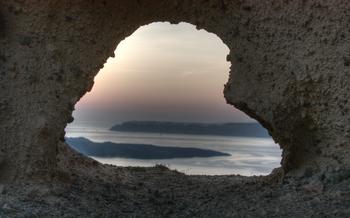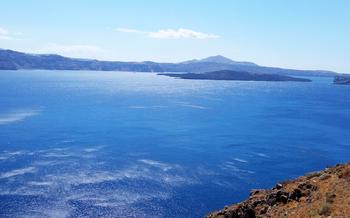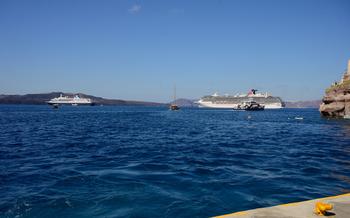
Koutsoyannopoulos Wine Museum
- The Antiquity of Greek Winemaking
- The Renaissance of Greek Wine
- The Koutsoyannopoulos Legacy
- The Unique Terroir of Santorini
- Cultivating Indigenous Grapes
- The Art of Winemaking at Koutsoyannopoulos
- Visiting the Koutsoyannopoulos Wine Museum
- A Journey Through Time
- Wine Tasting and Educational Tours
- Breathtaking Views and Photo Opportunities
- Cultural and Educational Experience
- A Glimpse into the Future
- Accessibility and Amenities
- Plan Your Visit
The Antiquity of Greek Winemaking
Greece's storied history of winemaking dates back to the depths of antiquity, intertwining with the country's mythology, culture, and society. Archaeological evidence unearthed from various sites across the country, including Crete, Santorini, and mainland Greece, provides tangible proof of wine production in Greece as early as 6000 BC. These discoveries showcase the ingenuity and expertise of ancient Greek winemakers, who cultivated grapes and crafted wine long before the rise of classical civilization.
Wine played a pivotal role in Greek mythology, symbolizing joy, celebration, and divine favor. Dionysus, the god of wine, was revered throughout the Greek world, and his festivals were marked by exuberant celebrations and the consumption of copious amounts of wine. Wine was also believed to be a gift from the gods, and its presence was considered essential at religious ceremonies and rituals.
Beyond its religious significance, wine was deeply embedded in Greek culture and society. It was a staple beverage, consumed at meals, social gatherings, and symposia, where philosophers, poets, and statesmen engaged in intellectual discourse while enjoying the pleasures of wine. Viticulture, the cultivation of grapes, was an important agricultural pursuit, and the Greeks developed advanced techniques for growing grapes and producing wine.
The Renaissance of Greek Wine
The revival of Greek winemaking in the 20th century marks a significant chapter in the history of Greek wine. After decades of neglect and decline, a group of passionate winemakers emerged, dedicated to revitalizing the country's viticultural heritage and producing wines that could rival those of the world's finest wine regions.
Among these pioneers were Evangelos Averoff, a visionary winemaker from Metsovo, and Yannis Boutaris, a young oenologist from Naoussa. Inspired by the potential of indigenous Greek grape varieties and the unique terroirs of the country, they set out to create wines that would showcase the authentic character of Greece.
Their efforts were met with success, and by the end of the 20th century, Greek wines had gained international recognition for their quality and diversity. Today, Greece is home to over 300 wineries, producing a wide range of wines that are enjoyed by wine lovers around the world.
The success of the Greek wine industry can be attributed to several factors. Firstly, the country's unique climate and soil conditions provide ideal growing conditions for grapes. Secondly, the revival of indigenous grape varieties, such as Assyrtiko and Xinomavro, has played a crucial role in defining the character of Greek wines. Thirdly, the adoption of modern winemaking techniques has enabled Greek winemakers to produce wines that meet international standards of quality and consistency.
As a result of these efforts, Greek wines have garnered numerous awards and accolades in international wine competitions. They have also found their way onto the wine lists of some of the world's most prestigious restaurants, further solidifying the reputation of Greece as a leading wine-producing country.
The Koutsoyannopoulos Legacy
The Koutsoyannopoulos family has a long and illustrious history in Santorini, dating back to the 19th century when they first arrived on the island from Crete. The family quickly established itself as a prominent landowner and viticulturist, and in 1910, George Koutsoyannopoulos, the patriarch of the family, founded the Koutsoyannopoulos Winery. George Koutsoyannopoulos was a visionary winemaker who recognized the potential of Santorini's unique terroir. He was determined to produce world-class wines that would showcase the island's unique characteristics. With hard work and dedication, he transformed the winery into one of the most respected and successful in Greece.
Under the leadership of George Koutsoyannopoulos's descendants, the winery continued to grow and prosper. In the 1970s, the family expanded the vineyards and introduced new winemaking techniques. They also began to export their wines internationally, and soon Koutsoyannopoulos wines were being enjoyed by wine lovers around the world.
Today, the Koutsoyannopoulos Winery is one of the leading producers of Santorini wines. The family remains committed to producing high-quality wines that reflect the unique character of the island. They are also passionate about sharing their love of wine with visitors to Santorini, and the Koutsoyannopoulos Wine Museum is a testament to their dedication to preserving and promoting the winemaking heritage of the island.
The Unique Terroir of Santorini
The volcanic soil of Santorini is a defining characteristic of the island's terroir. Formed from ancient eruptions, the soil is rich in minerals and nutrients, providing an ideal foundation for viticulture. The porous nature of the soil allows for excellent drainage, preventing waterlogging and promoting healthy root development.
The Aegean Sea exerts a profound influence on Santorini's winemaking. The sea's proximity creates a maritime climate, with cool breezes and high humidity. These conditions help to moderate temperatures, preventing excessive heat and preserving the acidity in the grapes. The salty air also contributes to the unique flavor profile of Santorini wines, imparting a subtle minerality.
The strong winds that sweep across Santorini play a crucial role in shaping the island's viticultural landscape. These winds help to reduce humidity, preventing the spread of fungal diseases and promoting healthy grape development. The winds also stress the vines, forcing them to produce thicker skins and smaller berries, resulting in grapes with concentrated flavors and higher acidity.
The combination of these factors creates a unique terroir that is ideally suited for viticulture. The volcanic soil, the maritime climate, and the strong winds work in harmony to produce grapes with intense flavors and distinctive characteristics, making Santorini's wines truly exceptional.
Cultivating Indigenous Grapes
Home to some of the oldest grape varieties in the world, Santorini's viticultural heritage is deeply rooted in the cultivation of indigenous grapes. Among these, two stand out: Assyrtiko and Mavrotragano. Assyrtiko, a white grape variety, is revered for its versatility and ability to thrive in Santorini's unique conditions. It produces crisp, mineral-driven wines with citrusy and floral notes. Mavrotragano, a red grape variety, is known for its deep color, intense aromas, and firm tannins. It yields elegant, age-worthy wines with flavors of red fruits, spices, and a hint of smokiness.
Cultivating these indigenous grapes is both a challenge and a privilege for Santorini's winemakers. The volcanic soil, strong winds, and limited water availability require meticulous viticultural practices. Low yields and careful canopy management are essential to ensure the grapes reach optimal ripeness while maintaining their distinctive characteristics.
The unique terroir of Santorini imparts a profound influence on Assyrtiko and Mavrotragano wines. The volcanic soil contributes minerality and depth, while the strong winds help retain acidity and prevent disease. The grapes develop thick skins, protecting them from the intense sunlight and producing wines with concentrated flavors and aromas.
The future of indigenous grapes in Santorini looks promising. With increasing global demand for authentic and terroir-driven wines, these varieties are gaining international recognition. Winemakers are committed to preserving and promoting the unique character of Santorini's indigenous grapes, ensuring their legacy continues for generations to come.
The Art of Winemaking at Koutsoyannopoulos
At the Koutsoyannopoulos Winery, winemaking is elevated to an art form, blending traditional techniques with modern innovation. The winery seamlessly merges the wisdom of the past with the advancements of the present, resulting in wines that are both authentic and contemporary.
The winemaking philosophy at Koutsoyannopoulos is deeply rooted in respect for the grapes and the unique terroir of Santorini. Traditional methods, such as hand-harvesting and gentle pressing, are employed to preserve the integrity of the fruit. This meticulous attention to detail extends throughout the winemaking process, from fermentation and barrel aging to bottling and labeling.
The winery's state-of-the-art facilities are equipped with modern technology, allowing for precise temperature control and other critical factors that influence the quality of the wine. However, technology is never used at the expense of tradition. Instead, it serves as a tool to enhance the natural characteristics of the grapes and express the essence of Santorini in every bottle.
The winemaking team at Koutsoyannopoulos is a symphony of experience and passion. Led by skilled enologists and viticulturists, they bring together their expertise and dedication to craft wines that are both true to tradition and distinctly modern. Their unwavering commitment to quality ensures that each bottle of Koutsoyannopoulos wine is a testament to their passion and artistry.
Visiting the Koutsoyannopoulos Wine Museum
The Koutsoyannopoulos Wine Museum is conveniently located in the heart of Santorini, offering easy access to visitors from all corners of the island. The architectural design of the museum is a testament to the family's passion for wine and their commitment to preserving the island's winemaking heritage. The museum's modern and spacious interior provides a welcoming environment for visitors to explore the history of winemaking in Santorini and indulge in the unique flavors of Koutsoyannopoulos wines.
The museum features interactive exhibits and displays that bring the history and culture of Santorini's winemaking tradition to life. Visitors can learn about the unique terroir of the island, the cultivation of indigenous grapes, and the traditional and modern techniques used in the winemaking process. The museum also offers a variety of educational programs and workshops that provide visitors with a deeper understanding of Greek winemaking and viticulture.
One of the highlights of a visit to the Koutsoyannopoulos Wine Museum is the opportunity to taste the winery's exceptional wines. Visitors can sample a variety of Koutsoyannopoulos wines, including their signature Assyrtiko and Mavrotragano varieties, while enjoying the stunning views of the Aegean Sea and the Caldera. The museum's knowledgeable staff is always on hand to provide information about the wines and to help visitors choose the perfect bottle to take home as a souvenir of their visit to Santorini.
A Journey Through Time
The Koutsoyannopoulos Wine Museum takes visitors on a captivating journey through the history of Greek winemaking, showcasing a collection of ancient winemaking tools and equipment that provide a glimpse into the time-honored traditions of the craft. The museum also delves into the rich history of the Koutsoyannopoulos family, tracing their journey from humble beginnings to becoming one of the most renowned wineries in Santorini. Visitors can explore the evolution of Greek winemaking through interactive exhibits and displays, gaining insights into the techniques and innovations that have shaped the industry over the centuries. The museum offers a unique opportunity to appreciate the dedication and passion that have gone into creating the exceptional wines of Santorini.
Wine Tasting and Educational Tours
The Koutsoyannopoulos Wine Museum offers visitors the opportunity to embark on a sensory journey through the world of Greek wine. Guided tours of the winery and the museum provide an in-depth exploration of the winemaking process, from grape cultivation to bottling and aging. Visitors can witness firsthand the traditional and modern techniques employed at the winery, gaining insights into the art and science behind wine production.
The highlight of the tour is the wine tasting experience, where visitors can sample a variety of Koutsoyannopoulos wines, each showcasing the unique characteristics of Santorini's terroir. Expert sommeliers guide participants through the tasting, explaining the flavors and aromas of each wine and providing insights into the factors that influence their distinctive qualities.
Educational tours are also available for those seeking a deeper understanding of Greek winemaking traditions and techniques. Led by experienced wine educators, these tours delve into the history of viticulture in Greece, the importance of indigenous grape varieties, and the challenges and benefits of cultivating grapes in Santorini's unique environment.
Visitors can also participate in interactive workshops and seminars, where they can learn about wine pairing, food and wine combinations, and the art of wine appreciation. These educational experiences offer a comprehensive exploration of the world of Greek wine, providing visitors with a newfound appreciation for the craftsmanship and passion that goes into each bottle.
Breathtaking Views and Photo Opportunities
The Koutsoyannopoulos Wine Museum offers visitors breathtaking views of the Aegean Sea and the Caldera. The winery and museum are situated on a hillside, providing panoramic vistas that stretch for miles. The picturesque setting, with its whitewashed buildings and lush vineyards, creates a stunning backdrop for photos. Visitors can capture the beauty of the Aegean sunset, the vibrant colors of the Caldera, and the picturesque architecture of the winery. Whether you're a professional photographer or simply looking to capture memories of your trip, the Koutsoyannopoulos Wine Museum provides ample opportunities for stunning photos. Take advantage of the natural beauty and create lasting memories of your visit to Santorini.
Cultural and Educational Experience
The Koutsoyannopoulos Wine Museum serves as a cultural hub in picturesque Santorini, providing visitors with an immersive experience that delves into the history, culture, and traditions of winemaking in Greece. Through its captivating exhibits and displays, the museum educates visitors on the art and science behind wine production, from ancient techniques to modern innovations. Visitors have the opportunity to appreciate the dedication and craftsmanship that goes into each bottle of Koutsoyannopoulos wine, gaining a deeper understanding of the unique flavors and characteristics that distinguish Santorini wines. This cultural and educational experience offers a chance to immerse oneself in the world of Greek wine, fostering a greater appreciation for its rich heritage and the passion that drives its production.
A Glimpse into the Future
The Koutsoyannopoulos Wine Museum not only celebrates the past but also looks towards the future of Greek winemaking. It showcases the winery's commitment to sustainable winemaking practices, showcasing innovative techniques that minimize environmental impact and preserve the unique terroir of Santorini. Visitors can learn about the winery's efforts to reduce water consumption, utilize renewable energy sources, and implement sustainable viticulture practices.
The museum also highlights the winery's dedication to preserving and promoting the unique winemaking heritage of Santorini. It showcases the family's ongoing research into indigenous grape varieties and traditional winemaking methods, ensuring that these traditions continue to thrive for generations to come. By embracing innovation while respecting tradition, the Koutsoyannopoulos Wine Museum offers a glimpse into the exciting future of Greek wine.
Accessibility and Amenities
The Koutsoyannopoulos Wine Museum is committed to providing a welcoming and accessible experience for all visitors. The museum is wheelchair accessible, ensuring that visitors with disabilities can fully enjoy the exhibits and the wine tasting experience. Clean and well-maintained restrooms are available on-site, ensuring the comfort and convenience of visitors. Ample parking space is provided, making it easy for visitors to park their vehicles.
For the convenience of visitors, a gift shop is located on-site, offering a variety of souvenirs and wine-related items. Visitors can purchase bottles of Koutsoyannopoulos wines, as well as other items such as wine glasses, corkscrews, and wine-themed gifts. Knowledgeable and friendly multilingual tour guides are available to assist visitors with any questions they may have and to provide additional information about the museum and the winery.
Plan Your Visit
The Koutsoyannopoulos Wine Museum is open to the public from Monday to Sunday, from 10:00 am to 6:00 pm. Admission fees are 10 euros for adults, 5 euros for students and seniors, and free for children under The recommended duration of the visit is approximately 1-2 hours, allowing ample time to explore the exhibits, taste the wines, and take in the breathtaking views.
To enhance your experience, consider booking a guided tour in advance. Guided tours are available in English, Greek, French, and German and provide an in-depth understanding of the museum's exhibits and the history of the Koutsoyannopoulos family.
Before your visit, explore the museum's official website for additional information, including detailed maps, directions, and online resources. This will help you plan your visit effectively and make the most of your time at the Koutsoyannopoulos Wine Museum.





